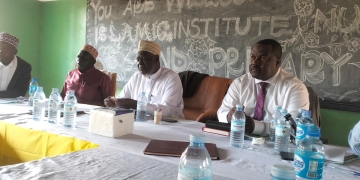
The coffee industry is an ever-growing market globally. Cafés around the world are always looking for the best coffee bean. An exotic coffee bean that is healthy, rich in taste, affordable and marketable, is always in demand. So, it is only natural that coffee buyers would look for produce that grows in the most suitable environments and in soil that is rich in nutrients.
This is why Ugandan farmers are ones to look at. Ugandan coffee beans are fine in taste, because of their low acidity, mild flavor and pleasant aroma. Uganda’s coffee export volumes and earnings has consistently grown over the past 20 years and now account for 7 percent of the world’s production. Farmers cultivate coffee trees in diverse terrain under the African sun.
As previously noted, Ugandan beekeepers offer a coveted varietal on honey to outside markets, the same applied to their kind of coffee products. However, there needs to be a union of sorts that brings together these diverse and sporadically situated farmers to one congregation. A place where farmers can bring their produce to one centralized place that can oversee the amalgamation of all the produce together, assessing and controlling the quality and ultimately packaging and selling the coffee beans.
The National Union of Coffee Agribusinesses and Farm Enterprises (NUCAFE) is doing just that, it is a social enterprise of coffee farmers in Uganda. NUCAFE’s membership currently comprises 200 farmer cooperatives and associations, consists of 215,120 farming families with 1,512,210 individual coffee farmers in the five coffee-growing regions in Uganda. This is a unique union which brings together many farmers and helps them consolidate and equally value their sales.
NUCAFE was set up to assist coffee farmers to profitably own their coffee along the value chain for their sustainable livelihood, and this is a reason why the United Nations Capital Development Fund (UNCDF) has supported them. Another reason is that they also employ people in their area, and provide locals with expertise on how to produce, assess and sell coffee, among other skills.
This is the case with newly employed Sylvia Newumbe. She is a 29-year-old Ugandan woman who comes from a family of coffee growers. She sought an internship to expand her work skills during the strictest times of COVID lockdowns. She found a trainee position at NUCAFE, with an aim to broaden her skillset.
Prior to joining NUCAFE, she was an unemployed coffee bean grower, who previously sold her coffee beans raw and without quality checking from her own home or made local deliveries to sellers with different price points.
Newumbe says that her Arabica coffee beans where the best in her area of Mbale, but the sales were inconsistent and uneven depending on the demand, which would change seasonally. Joining NUCAFE has opened her eyes to many new ways of processing and improving the quality of the coffee bean, whether during cultivation or after harvesting.
“It has changed my career because it generally improved my skills, and this will in turn help me to also inform the women in my village of what I learned here. When I finish my traineeship, I plan to continue my work with coffee in my area, as my dream is to have my own Coffee Shop in Mukono,” said Newumbe while testing some coffee beans for quality control at the NUCAFE factory.
Newumbe grew up around coffee farms, her parents used to grow coffee – however she did not know much about hulling, polishing, grading and sorting the dried cherries. These are the steps in ensuring the coffee beans sold are in good shape and are ready for sale. Her time at NUCAFE expanded her skills in these areas.
“If I can accomplish my dream of opening my own coffee shop, I would buy my coffee from NUCAFE. They have fare prices and there are varieties,” explained Newumbe.
The very first trainee at NUCAFE is now the Deputy Executive Director of Operations Management at NUCAFE. Deus Nuwagaba handles the day-today operations of the factory, and has a hand at export marketing, training, mentoring, roasting, grinding and packaging.
The training center is open to 500 trainee cohorts. There is a 60 percent female target for these new trainees. The center not only includes training, but also coaching and mentoring. When done with training, the participants are either retained or are taken up by other coffee companies, who work with NUCAFE or others they apply to. NUCAFE also encourages them to start their own entrepreneurial enterprises and has the ability to connect them to other buyers in their areas.
Nuwagaba said: “We worked with UNCDF to unlock our local financing access and we managed to get funding from UDB (Uganda Development Bank), Centenary Bank, aBi (Agricultural Business Initiative) among others. We also received an interface that helped as a database for sales and more.”
He continued: “UNCDF created customized financing, they appreciated the last mile, which is an area that might not be considered by many banks, but UNCDF helps with some components that help to unlock financing, which is of great help.”
“Most of the local financing institutions use the formal way, UNCDF comes in to help with risk assessment and aids as a partner that can give us a unique perspective on how we approach a financing institution.”
The Executive Director of NUCAFE, Joseph Nkanda, asserted: “We speak to 10 SDGs. This includes partnerships. In a year we will be able to hold 36,000 tons of coffee beans. We will require 12 million dollars to move forward.”
NUCAFE works with 215 cooperatives who benefit approximately 250,000 families. The cooperatives act as middlepersons that connect the rural areas with the factory. Nkanda confirms that 90 percent of the profit they make goes back to the farmer, the 10 percent remains with cooperatives and NUCAFE. The cooperatives themselves are created by NUCAFE, through a due diligence processes prior to linking them to financial institutions.
To put it in clearer terms, Nkanda explained: “If the families contributing [their produce] would have an increase in 250 percent of the value added, we allow the farmer to upgrade in the value chain. We aim to break that generational poverty by allowing all generations to add value. They are also more likely to invest better in solar power and put their kids in schools and improve their shelters and build permanent houses.”
NUCAFE currently works with other countries in the region, boosting South-South Cooperation. Currently they have ties with companies in Rwanda and Burundi. Moreover, they are excited about a collaboration with Brazil and they have created an agri-business incubator in Makerere University.
“Coffee skills are lacking, we don’t have them in our university. They lack the skills; we operate as an academy. [Interested parties] come with agri-business ideas that turn into real business plans. We would like to create our own courses. The ones that we have were passed on from Britain, the curricula lack the local narrative,” said Nkanda, while holding some of the newly-roasted coffee beans in the palm of his hands.
UNCDF provided NUCAFE technical assistance to develop a bankable project and issued a seed grant of US$ 225,000, which unlocked US$ 1.7m from other financiers, including the Uganda Development Bank. The coffee processing equipment, additional warehousing and training space procured with this money enabled NUCAFE to scale up its operations, increase output and improve quality of the final product.
At the same time, NUCAFE was a beneficiary of UNCDF’s Innovate4Agriculture Innovation Challenge. The seed capital offered by this Innovation Challenge helped NUCAFE to design and introduce a customized agro-food traceability digital system for agri-value chain management (traceability, aggregation and bulking, access to markets, access to information and loyalty). Traceability is an important factor to prove the provenance of the final product, especially its organic varieties, and thus to command a higher market premium. Lastly, UNCDF introduced NUCAFE to the London Stock Exchange Group, where it qualified and was listed as one of the companies to Inspire Africa in 2019.
For the future, the company’s aims are to set up a Coffee Entrepreneurship Center, expand their business facility and also promote and franchise a newly opened coffeeshop brand they have started called Omukago Café. By 2030 they aim to do all the expansions, they want to create decent employment for approximately 10,000 people, nationally or locally.
Nkanda concluded: “Our coffee is a coffee with a story, it’s coffee with a human face.”










